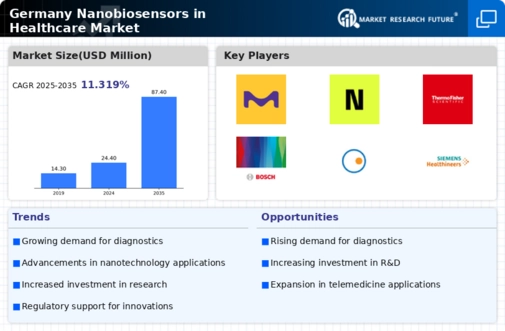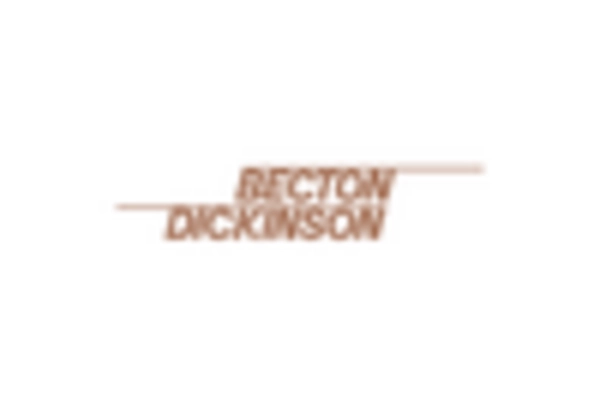Growing Prevalence of Chronic Diseases
The rising prevalence of chronic diseases in Germany is a critical driver for the nanobiosensors in-healthcare market. Conditions such as diabetes, cardiovascular diseases, and cancer are becoming increasingly common, necessitating advanced monitoring and diagnostic tools. The demand for continuous health monitoring solutions is expected to surge, with the chronic disease management market projected to reach €50 billion by 2026. Nanobiosensors, with their ability to provide real-time data and facilitate early detection, are well-positioned to address these healthcare challenges. This growing need for effective disease management solutions is likely to stimulate the adoption of nanobiosensors across various healthcare settings.
Increased Investment in Healthcare R&D
Germany's commitment to healthcare research and development (R&D) is a significant driver for the nanobiosensors in-healthcare market. The government and private sector are investing heavily in innovative healthcare solutions, with R&D spending reaching approximately €40 billion annually. This financial backing fosters an environment conducive to the development of advanced nanobiosensor technologies. As research institutions collaborate with industry players, the potential for breakthroughs in diagnostics and monitoring increases. The emphasis on innovation is likely to propel the adoption of nanobiosensors, as they offer unique capabilities in detecting biomarkers and pathogens, thus enhancing diagnostic accuracy and patient outcomes.
Rising Demand for Point-of-Care Testing
The increasing demand for point-of-care testing in Germany is a pivotal driver for the nanobiosensors in-healthcare market. Patients and healthcare providers are seeking rapid diagnostic solutions that can be administered outside traditional laboratory settings. This trend is underscored by a growing preference for immediate results, which enhances patient management and treatment decisions. The market for point-of-care testing is projected to grow at a CAGR of approximately 10% over the next five years, indicating a robust opportunity for nanobiosensor technologies. As healthcare systems strive for efficiency, the integration of nanobiosensors into point-of-care devices is likely to gain traction, thereby expanding the market's footprint in Germany.
Regulatory Framework Supporting Innovation
The regulatory framework in Germany is increasingly supportive of innovation in the nanobiosensors in-healthcare market. Regulatory bodies are streamlining approval processes for new medical devices, which encourages the development and commercialization of advanced biosensing technologies. Initiatives aimed at fostering innovation, such as the Medical Device Regulation (MDR), are designed to ensure safety while promoting technological advancements. This supportive environment is likely to facilitate the entry of novel nanobiosensor products into the market, enhancing competition and driving further advancements in healthcare diagnostics. As regulations evolve, they may also provide clearer pathways for the integration of nanobiosensors into routine clinical practice.
Technological Advancements in Nanotechnology
Technological advancements in nanotechnology are significantly influencing the nanobiosensors in-healthcare market. Innovations in materials science and engineering are enabling the development of more sensitive and specific biosensors. In Germany, research institutions are at the forefront of these advancements, focusing on enhancing the performance of nanobiosensors for medical applications. The integration of nanomaterials, such as graphene and carbon nanotubes, is expected to improve the detection limits and response times of biosensors. As these technologies evolve, they are likely to attract further investment and interest from healthcare providers, thereby expanding the market's potential.
















